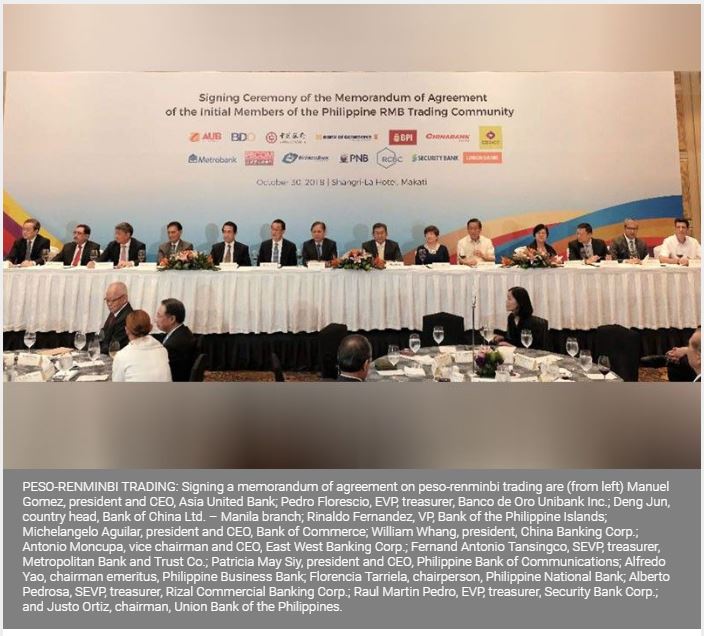Philippines: Currency deal seen to corner $120 billion investments from China
MANILA, Philippines — The Philippines is expected to win a larger share of China’s overseas investments, reaching an estimated $120 billion with the signing of an agreement that would pave the way for the direct conversion of the respective currencies of the two countries under a so-called Philippine Renminbi Trading Community (PRTC) and peso-renminbi spot market, according to Finance Secretary Carlos Dominguez.
Dominguez said this milestone in the area of economic cooperation between the two countries also offers the Philippines, through the price discovery process, improved access to China’s bond market, where the government plans to establish a recurrent presence by issuing panda bonds every 12 to 18 months.
The memorandum of agreement (MOA) signed yesterday by 13 Filipino banks and the local branch of the Bank of China provides the provisional framework, scope and criteria for membership of the PRTC, which would be under the direct supervision of the Bangko Sentral ng Pilipinas (BSP). self PRTC will serve as the precursor leading to the launching of the peso-renminbi foreign exchange spot market.
Aside from the Manilabranch of the Bank of China, the other signatories to the MOA, which comprise the initial members of the PRTC are: Asia United Bank, Bank of Commerce, Bank of the Philippine Islands, BDO Unibank Inc., China Banking Corp., East West Banking Corp., Metropolitan Bank and Trust Company, Philippine Bank of Communications, Philippine Business Bank, Philippine National Bank, Rizal Commercial Banking Corp., Security Bank Corp., and Union Bank of the Philippines.
The PRTC will later open its doors to new members seeking to take part in the trading platform in the future, Dominguez said.
“We take this major step forward in the economic partnership between the Philippines and China. On both sides, there is confidence that this partnership will bring great benefits to both our peoples. This is a partnership nurtured by the warm friendship between our two countries,” Dominguez said during the MOA signing ceremony.
Dominguez,Bangko Sentral ng Pilipinas (BSP) Deputy Governor Chuchi Fonacier and former BSP Governor Amando Tetangco Jr. were among those who witnessed the signing of the MOA held at the Makati Shangri-La, Manila in Makati City.
“We are now taking the first steps toward building the mechanism for the direct conversion of our currencies. The volume of business between our two economies justifies establishing this. The banks participating in this memorandum of agreement will set in motion the process of setting up a -regulating organization that will oversee a transparent currency trading platform,” Dominguez said. “We anticipate a significant reduction in the cost of doing business across our two economies as a result of this.”
With the establishment of the community, Bank of China Manila country head Deng Jun expects trade between the Philippines and China to expand further.
“The Philippine RMB Trading Community will likely lead to increased direct trade between Chinese and Philippine businesses because there will be no need to first exchange Philippine pesos to US dollars for conversion to Chinese RMB. With this, pesos can be converted directly to Chinese RMB,” he said.
At present, the peso and RMB are priced against the dollar as an intermediate peg. This subjects them to conversion and other friction costs.
BSP Deputy Governor Chuchi Fonacier said the development of a local RMB trading market in the country was “timely and deserves particular attention” given that China is the country’s top bilateral trading partner. She said trade between the two countries reached $14.1 billion, 16.6 percent of total trade, as of end-June.
She said this platform would help facilitate the use of renminbi as a settlement currency, and therefore make payments more efficient, and lessen cost for exporters and importers.
“By establishing the peso-RMB trading market, the Philippine peso can be directly priced against the RMB, so initial participating bank-members can streamline their currency conversion costs by a fair, transparent and resilient domestic FX trading platform,” Fonacier said.
Finance Secretary Carlos Dominguez, said the creation of the trading community would bring benefit not only to the private sector, but also to the government.
“We foresee improved access to China’s bond market using the price discovery process created by this mechanism,” “ Dominguez said.
The finance chief expressed hope the peso-renminbi trading market would pave way toward setting up similar arrangements with other currencies, particularly the Japanese yen.
The peso-renminbi trading market, to be operated by the Philippine RMB Trading Community, is the second stage of the plan to develop the domestic RMB services in the country.
Bank of China said the community is tasked to create and implement the systems, rules, regulations, and standard operating procedures on trading and settlement; internal rules; appointment of system providers; and other matters on the operation of the community.
It will also report to the BSP any non-compliance issues.
The trading community will be a self-regulated body, in which ideas will be shared among its members and with financial regulators. It will develop and adapt standards in infrastructure building, trading conventions, and other standard protocols.
Deng Jun said the infrastructure for the direct trading of peso and renminbi is expected to be operational by next month.
Source: https://www.philstar.com/business/2018/10/31/1864537/currency-deal-seen-corner-120-billion-investments-china#FS0Uoh3WMTxrPu4e.99


 English
English




